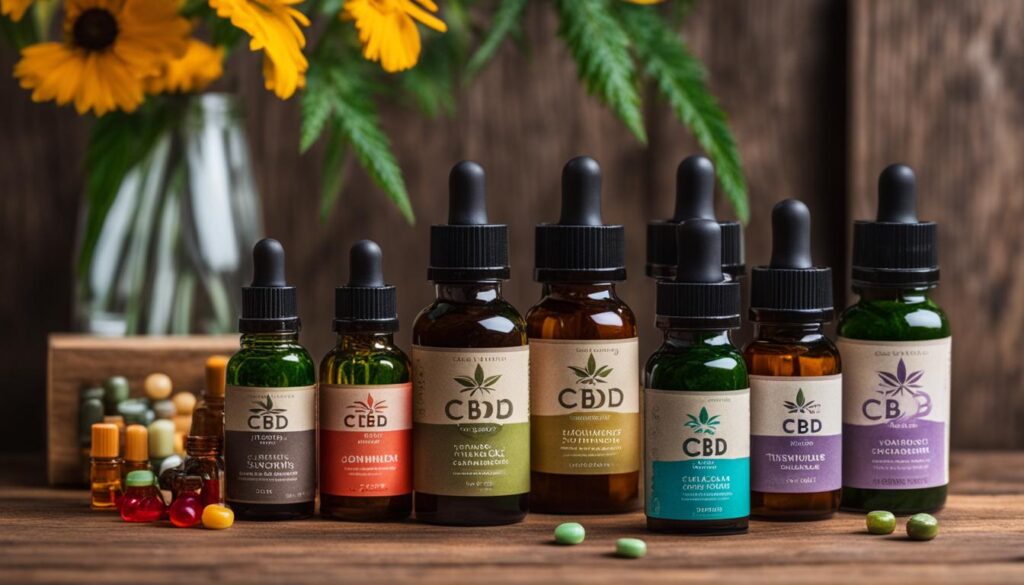Grasping the Concept: Understanding How CBD Oil Works for Us
Welcome to our comprehensive guide on CBD oil and its fascinating effects on our bodies. As CBD oil gains popularity for its potential health benefits, we delve into the science behind its workings. Whether you're curious about how CBD oil interacts with our endocannabinoid system or want to know more about its potential benefits, you've come to the right place.
Derived from the Cannabis sativa plant, CBD oil contains cannabidiol (CBD), a chemical compound that interacts with our body's endocannabinoid system (ECS). This intricate network of receptors regulates various functions, including pain management, mood regulation, and sleep patterns. By binding to these receptors, CBD helps restore balance and regulate these bodily functions.
Key Takeaways:
- Understanding how CBD oil interacts with our body's endocannabinoid system is key to grasping its effects.
- CBD is derived from the cannabis plant and contains cannabidiol, a compound that helps regulate various physiological functions.
- The endocannabinoid system plays a crucial role in maintaining overall health, and CBD assists in supporting its proper functioning.
- CBD oil works through various mechanisms, affecting neurotransmitter systems, pain receptors, and inflammation markers.
- Further research is still needed to fully understand CBD oil's optimal dosages, potential risks, and mechanisms of action.
What is CBD Oil?
CBD oil is a natural product that is made by extracting CBD from the cannabis plant and diluting it with a carrier oil. It is non-intoxicating and safe for everyone. CBD interacts with receptors in the endocannabinoid system to support homeostasis and has been shown to have unique interactions with pain receptors, inflammation markers, and neurotransmitters in the brain. It offers potential benefits for reducing anxiety, managing pain, improving sleep, and promoting overall health and well-being.
One of the key advantages of CBD oil is its versatility. It can be consumed in various forms, including tinctures, capsules, gummies, and topicals. Each form has its own advantages and absorption rates, allowing individuals to choose the method that best suits their needs and preferences.
When selecting a CBD oil product, it is important to choose a reputable brand that conducts third-party testing for quality and purity. Look for products that are sourced from organic hemp and have a clear and transparent ingredient list. By choosing a high-quality CBD oil, you can ensure that you are receiving the full benefits of this natural remedy.
The Benefits of CBD Oil
- Reduces anxiety and stress
- Manages pain and inflammation
- Improves sleep quality
- Promotes overall health and well-being
“CBD oil has the potential to be a valuable addition to a healthy lifestyle for those seeking natural alternatives for health and wellness.”
As more research is conducted on CBD oil, its potential benefits continue to emerge. However, it is important to note that individual results may vary and consultation with a healthcare professional is recommended before starting any new supplement regimen.
Understanding the Endocannabinoid System (ECS)
The endocannabinoid system (ECS) is a vital component of our body's regulatory system, playing a crucial role in maintaining balance and homeostasis. It consists of three main components: endocannabinoids, receptors, and enzymes. Let's explore each of these elements and understand how CBD interacts with the ECS.
The Endocannabinoids:
Endocannabinoids are naturally occurring compounds in our bodies that bind to cannabinoid receptors. The two primary endocannabinoids identified so far are anandamide and 2-arachidonoylglycerol (2-AG). These endocannabinoids are synthesized on-demand in response to various physiological needs, such as pain regulation or stress response.
The Receptors:
The receptors of the ECS are found throughout the body and are divided into two main categories: CB1 and CB2 receptors. CB1 receptors are primarily found in the central nervous system, while CB2 receptors are predominantly located in the peripheral tissues, especially in the immune system. These receptors act as signaling gateways, allowing endocannabinoids to bind and transmit their signals to regulate various processes.
The Enzymes:
Enzymes are responsible for the breakdown of endocannabinoids once their function is complete. The main enzymes involved in the ECS are fatty acid amide hydrolase (FAAH), which breaks down anandamide, and monoacylglycerol lipase (MAGL), which breaks down 2-AG. These enzymes ensure that the endocannabinoids are not continuously active and maintain balance within the system.
Now that we have a basic understanding of the ECS, let's delve into how CBD interacts with this complex system. CBD acts indirectly on the ECS by influencing the production, breakdown, and binding of endocannabinoids. It enhances the levels of endocannabinoids by inhibiting the enzymes responsible for their breakdown, thus allowing them to exert their effects for a longer duration.
Moreover, CBD interacts with other receptors in the ECS and beyond, such as serotonin receptors, TRPV1 receptors, and GPR55 receptors. These interactions contribute to CBD's wide range of potential therapeutic effects, including pain relief, anxiety reduction, and overall regulation of bodily functions. CBD's ability to modulate neurotransmitter activity and promote homeostasis makes it a promising tool for enhancing our well-being.
Understanding the intricacies of the endocannabinoid system allows us to appreciate the potential benefits of CBD. By supporting the ECS, CBD plays a crucial role in helping our bodies maintain balance and optimal functioning. The interaction between CBD and the ECS opens up exciting possibilities for natural health and wellness.

“The endocannabinoid system is a complex network of elements that helps regulate various physiological processes in our bodies.”
The Mechanisms of CBD Oil in the Body
When it comes to understanding how CBD oil works in the body, it's important to explore its mechanisms of action. CBD, or cannabidiol, interacts with various receptors and neurotransmitter systems, resulting in its potential therapeutic effects. Here, we'll delve into the key mechanisms through which CBD oil exerts its influence on the body.
Modulation of Neurotransmitters
One of the ways CBD oil affects the body is by interacting with neurotransmitters. Research suggests that CBD may impact serotonin receptors, which play a role in mood regulation. By binding to these receptors, CBD has the potential to elevate mood and reduce anxiety.
Interactions with Pain Receptors
CBD oil may also interact with pain receptors in the body, such as vanilloid receptors. These receptors are responsible for pain perception and inflammation. By binding to these receptors, CBD may help alleviate pain and reduce inflammation, offering potential benefits for individuals dealing with chronic pain conditions.
Modulation of CB Receptors
CBD has been shown to interact with CB receptors, which are part of the body's endocannabinoid system. These receptors are involved in pain sensation and the immune response. CBD's interaction with CB receptors may contribute to its analgesic and anti-inflammatory properties.
It's important to note that the precise mechanisms underlying CBD oil's effects in the body are still being researched. The interactions mentioned here are part of the current understanding, but further studies are needed to fully elucidate the complete range of CBD oil's actions.
Different Types of CBD Products
When it comes to CBD products, there are numerous options available to suit different needs and preferences. Here are some of the most common types of CBD products:
CBD Oil Drops
CBD oil drops are one of the most popular forms of CBD products. They typically come in small bottles with a dropper for easy and precise dosing. CBD oil drops are taken sublingually (under the tongue) and provide fast absorption into the bloodstream. They are versatile and can be easily incorporated into daily routines.
CBD Capsules
CBD capsules are a convenient option for those who prefer a pre-measured dose of CBD. They come in capsule form and can be easily swallowed with water. CBD capsules are tasteless and provide a consistent and controlled dosage. They are especially popular among individuals who are always on the go.
CBD Gummies
CBD gummies are a fun and tasty way to consume CBD. They are infused with CBD and come in various flavors, shapes, and sizes. CBD gummies offer a discreet and enjoyable option for those who don't enjoy the natural taste of CBD oil. They are a great choice for beginners and those with a sweet tooth.
CBD Topicals
CBD topicals are products that are applied directly to the skin. They come in the form of creams, lotions, balms, and salves. CBD topicals are typically used for targeted relief and can be applied to specific areas of discomfort or inflammation. They are commonly used for muscle and joint pain, as well as skincare.
CBD Pet Products
CBD products for pets are specifically formulated for our furry friends. They come in various forms such as CBD oil, treats, and balms. CBD pet products can help support overall wellness in animals and may provide relief for issues such as anxiety, joint discomfort, and digestion problems.
It's important to choose a CBD product that aligns with your needs and preferences. Consider factors such as dosage, convenience, taste, and application method when selecting the right CBD product for you.

| Product | Benefits | Application |
|---|---|---|
| CBD Oil Drops | – Fast absorption – Easy dosing |
Sublingual |
| CBD Capsules | – Convenient and pre-measured – Tasteless |
Oral ingestion |
| CBD Gummies | – Fun and tasty – Discreet |
Oral ingestion |
| CBD Topicals | – Targeted relief – Skincare benefits |
Topical application |
| CBD Pet Products | – Supports pet wellness – Relief for specific issues |
Varies (oil, treats, balms) |
How CBD Oil Works for Different People
When it comes to CBD oil, its effectiveness can vary from person to person. Every individual may have a unique response to CBD, influenced by factors such as dosage, frequency of use, body chemistry, and the specific symptoms being treated. Finding the optimal dosage and frequency of CBD oil may require some experimentation and individualized adjustments.
It is recommended to start with a low dose of CBD oil and gradually increase until the desired effects are achieved. This allows the individual to gauge their response and find the right balance. It's important to note that CBD oil is generally well-tolerated and safe, but it's always wise to consult with a healthcare professional before starting any new supplement.
“The effectiveness of CBD oil can vary among individuals. Some people may experience relief from their symptoms after just one dose, while others may require more frequent use.”
Keep in mind that CBD oil takes time to build up in the body and may require consistent use for optimal results. Patience is key when using CBD oil, as it can take several weeks to feel the full effects. It's important to track your progress and adjust the dosage as needed.
Overall, CBD oil offers a wide range of potential benefits for different individuals. It has been studied for its potential to reduce anxiety, manage pain, improve sleep, and promote overall well-being. However, each person's response may vary, so it's important to find the right dosage and frequency that works best for you. CBD oil can be a valuable addition to a healthy lifestyle, providing natural alternatives for those seeking relief from various symptoms.
Table: CBD Dosage Recommendations
| Symptom/Condition | Starting Dosage | Recommended Dosage Range |
|---|---|---|
| Anxiety | 5-10 mg | 10-40 mg |
| Pain | 10-20 mg | 20-100 mg |
| Insomnia | 5-10 mg | 10-50 mg |
| Inflammation | 10-20 mg | 20-100 mg |
The Benefits of CBD Oil
When it comes to CBD oil, there are a multitude of potential benefits that have been studied and reported. CBD oil has gained popularity for its ability to address various health concerns, offering a natural alternative for those seeking relief. Let's explore some of the potential benefits that CBD oil may provide.
1. CBD Oil for Anxiety
Anxiety is a common condition that affects many individuals, and CBD oil has been studied for its potential in reducing anxiety symptoms. CBD interacts with receptors in the brain that regulate stress and anxiety, potentially promoting relaxation and ease. Research has shown promising results, indicating that CBD oil may have a calming effect and help individuals manage anxiety-related disorders.
2. CBD for Pain Relief
Pain relief is another area where CBD oil may offer benefits. CBD interacts with pain receptors in the body, potentially reducing pain and inflammation. Whether it's chronic pain or acute discomfort, CBD oil has been studied for its potential analgesic properties. This natural approach to pain management has gained attention and interest among those seeking alternatives to traditional pain medications.
3. Other Potential Benefits
In addition to anxiety relief and pain management, CBD oil has been studied for other potential benefits. It may have neuroprotective properties, potentially offering support for individuals with neurological conditions such as epilepsy or multiple sclerosis. CBD oil may also support overall immune function and promote better sleep. While research is ongoing, these potential benefits offer hope for individuals looking to incorporate natural remedies into their wellness routine.
It's important to note that further research is needed to fully understand the extent of CBD oil's benefits. Individual experiences may vary, and it's always recommended to consult with a healthcare professional before incorporating CBD oil into your routine. Choosing a reputable CBD brand and ensuring proper dosing is essential for maximizing the potential benefits of CBD oil.
| Potential Benefits of CBD Oil | Studies and Research |
|---|---|
| Anxiety Relief | Several studies have shown CBD's potential in reducing anxiety symptoms and promoting relaxation. However, more research is needed to determine optimal dosages and long-term effects. |
| Pain Management | CBD oil has been studied for its potential analgesic properties, offering a natural alternative for individuals dealing with chronic pain or acute discomfort. |
| Neuroprotective Properties | Research suggests that CBD oil may have neuroprotective properties, potentially benefiting individuals with neurological conditions such as epilepsy and multiple sclerosis. However, further studies are needed to fully understand its mechanisms. |
| Overall Immune Support | Some studies indicate that CBD oil may support overall immune function, potentially boosting the body's defense mechanisms. However, more research is needed to determine its effectiveness on immune-related conditions. |
| Better Sleep | CBD oil has been reported to promote better sleep and improve sleep quality. However, individual results may vary, and further research is needed to establish the optimal dosage and long-term effects. |
How to Choose Quality CBD Oil
When it comes to choosing CBD oil, quality is of utmost importance. With the growing popularity of CBD products, it's crucial to know how to differentiate between high-quality options and inferior ones. Here are some key factors to consider when selecting CBD oil:
1. Sourcing
One of the first things to look for is where the CBD oil is sourced from. Opt for products that are made from organic, sustainable hemp plants. These plants are less likely to contain harmful pesticides, herbicides, and other chemicals that can be present in conventionally grown hemp.
2. Third-Party Testing
Third-party testing is an essential aspect of ensuring the quality and safety of CBD oil. Reputable brands will have their products tested by independent laboratories. The test results, also known as a Certificate of Analysis (COA), should be readily available to consumers. These COAs provide information about the cannabinoid content, potential contaminants, and the accuracy of the product's labeling.
3. Transparency
Choose CBD oil brands that are transparent about their manufacturing processes and ingredient lists. Look for clear and detailed information about the extraction methods used, as well as any additional ingredients in the product. A reliable brand will be open and honest about the sourcing and production of their CBD oil.
By considering these factors, you can ensure that you're selecting a high-quality CBD oil that meets your needs and preferences. Remember to do thorough research, read customer reviews, and consult with healthcare professionals if needed. Taking the time to choose a reputable brand will give you peace of mind and maximize the potential benefits of CBD oil.
How to Use CBD Oil
When it comes to using CBD oil, there are several methods and considerations to keep in mind. Understanding how to properly use and dose CBD oil is essential to maximize its potential benefits. Here, we will explore different usage options, dosing guidelines, and applications of CBD oil.
Methods of Administration
CBD oil can be administered in various ways, depending on personal preference and desired effects. The most common method is sublingual administration, which involves placing a few drops of CBD oil under the tongue and allowing it to absorb through the sublingual glands. This method promotes rapid absorption into the bloodstream, resulting in faster onset of effects. Alternatively, CBD oil can be added to food or beverages, although the effects may take longer to kick in due to the need for digestion.
Another option is topical application, where CBD oil is directly applied to the skin. This method is particularly useful for localized pain or skin conditions, as it allows for targeted relief. Topical CBD products come in various forms, including creams, balms, and salves.
Dosing Guidelines
When it comes to dosing CBD oil, it is important to start low and gradually increase the dose until the desired effects are achieved. Each individual may respond differently to CBD, so finding the optimal dose may require some experimentation.
A general guideline is to start with 1-6mg of CBD for every 10 pounds of body weight. For example, a person weighing 150 pounds could start with a dose of 15-90mg of CBD. It is recommended to divide the total daily dose into two or three smaller doses throughout the day.
It's important to note that CBD oil may interact with certain medications, so it's best to consult with a healthcare professional before starting CBD oil to ensure safety and avoid any potential drug interactions.
| Body Weight (lbs) | Starting Dose (mg) | Maximum Dose (mg) |
|---|---|---|
| 100 | 10 | 60 |
| 150 | 15 | 90 |
| 200 | 20 | 120 |
Table: Dosing Guidelines for CBD Oil Based on Body Weight
The Importance of Choosing a Reputable CBD Brand
When it comes to CBD oil, choosing a reputable brand is of utmost importance. With the increasing popularity of CBD products, it's essential to ensure that you are getting a high-quality and reliable product that meets your needs. So why is it important to choose a reputable CBD brand? Let's explore.
First and foremost, a reputable CBD brand prioritizes quality control. They understand the importance of providing a safe and effective product to their customers. These brands often have rigorous testing procedures in place, ensuring that their products are free from harmful contaminants and accurately labeled. Look for brands that provide detailed information about their sourcing, extraction methods, and third-party testing. This transparency is a testament to their commitment to quality.
In addition to quality control, a reputable CBD brand will have a strong reputation within the industry. They will have positive customer reviews and a loyal customer base. By choosing a brand with a good reputation, you can have confidence in their products and trust that you are making a wise investment in your health and wellness. Take the time to research different brands, read customer reviews, and seek recommendations from trusted sources.
Remember, the CBD industry is still relatively new and unregulated. This means that there are some less reputable brands out there looking to take advantage of the market. By choosing a reputable CBD brand, you can avoid falling victim to low-quality products or misleading claims. Putting in the effort to find a trustworthy brand is worth it in the long run, as it ensures that you are getting a product that is safe, effective, and aligns with your values.
“Choosing a reputable CBD brand is essential for ensuring that you are getting a high-quality and reliable product. By prioritizing quality control and maintaining a strong industry reputation, these brands provide peace of mind to their customers.” – CBD Wellness Magazine
The Importance of Choosing a Reputable CBD Brand
| Benefits of Choosing a Reputable CBD Brand | Why It Matters |
|---|---|
| Quality Control | Ensures the product is safe, free from contaminants, and accurately labeled. |
| Reputation | Indicates a brand's trustworthiness and reliability based on positive customer reviews and industry recognition. |
| Avoiding Low-Quality Products | Protects consumers from subpar CBD products that may not deliver the desired effects or could be potentially harmful. |
| Peace of Mind | Allows consumers to confidently invest in CBD products that align with their values and wellness goals. |
By choosing a reputable CBD brand, you are ensuring that you are getting a high-quality product that meets your expectations. Don't be swayed by fancy packaging or low prices; instead, prioritize quality control, industry reputation, and transparent practices. Your health and wellness deserve the best, so take the time to choose a CBD brand that you can trust.
Conclusion
In summary, CBD oil has gained popularity for its potential health benefits and its interaction with the body's endocannabinoid system. Through its modulation of various neurotransmitter systems and receptors, CBD oil may offer relief for anxiety, promote relaxation, alleviate pain, and support overall well-being. However, it's important to note that further research is needed to fully understand its mechanisms of action, optimal dosages, and potential risks.
Choosing a reputable CBD brand is essential to ensure the quality and reliability of the product. Look for brands that prioritize quality control, provide information about their sourcing and extraction methods, and undergo third-party testing. By individualizing dosing based on personal needs and response, CBD oil can be a valuable addition to a healthy lifestyle for those seeking natural alternatives for health and wellness.
In conclusion, CBD oil has shown promise in its ability to support various aspects of health. As research continues to expand, we will gain a deeper understanding of its potential benefits and applications. For now, it is important to approach CBD oil with an informed perspective and choose high-quality products from reputable brands. With the right approach, CBD oil has the potential to enhance overall well-being and contribute to a healthier lifestyle.
FAQ
What is CBD oil?
CBD oil is a natural product made by extracting CBD from the cannabis plant and diluting it with a carrier oil. It contains the chemical compound cannabidiol (CBD) and is known for its potential benefits for overall health and well-being.
How does CBD oil work in the body?
CBD oil works in the body by interacting with the endocannabinoid system (ECS), a complex cell-signaling system that regulates various physiological processes. It interacts with receptors in the ECS to support homeostasis and has unique interactions with pain receptors, inflammation markers, and neurotransmitters in the brain.
What are the different types of CBD products available?
CBD products come in various forms, including oil drops, capsules, gummies, topicals, and even products for pets. Each form may have different methods of absorption and onset of action, allowing individuals to choose a product that suits their preferences and dosage needs.
How effective is CBD oil?
The effectiveness of CBD oil can vary among individuals. While some people may experience relief from their symptoms after just one dose, others may require more frequent use. Factors such as dosage, frequency, individual body chemistry, and specific symptoms being treated can influence the response to CBD oil.
What are the potential benefits of CBD oil?
CBD oil has been studied for its potential to reduce anxiety and stress, promote relaxation and better sleep, alleviate pain and inflammation, support overall immune function, and even have neuroprotective properties. However, more research is needed to fully understand the extent of its benefits.
How do I choose quality CBD oil?
When choosing CBD oil, it's important to consider quality and reliability. Look for products that have been tested by third-party laboratories and provide a certificate of analysis (COA) for accurate labeling and safety. Seek out CBD oil sourced from organic, sustainable hemp plants and with a clear and transparent ingredient list.
How do I use CBD oil?
CBD oil can be taken sublingually using a dropper for precise dosing. It can also be added to food or beverages, although the onset of effects may be slower due to digestion. Topical application of CBD oil is another option for localized pain or skin conditions. It's important to start with a low dose and gradually increase based on individual needs and response.
Why is it important to choose a reputable CBD brand?
Choosing a reputable CBD brand is crucial to ensure you are getting a high-quality and reliable product. Look for brands that prioritize quality control, provide detailed information about their sourcing and third-party testing, and have positive customer reviews. Doing thorough research helps ensure you choose a brand that aligns with your values and priorities.
Source Links
- https://neurogan.com/blogs/news/how-cbd-works-in-the-body
- https://www.mycannabis.com/how-cbd-works-in-the-brain/
- https://greenvalleynutrition.com/pages/cbd-101-cannabinoid-science











Leave a Reply